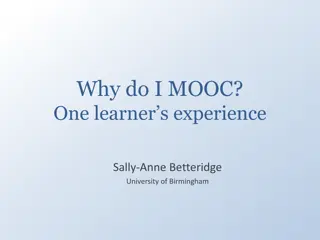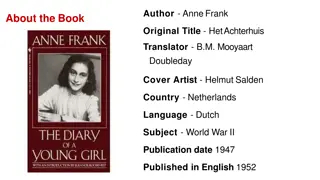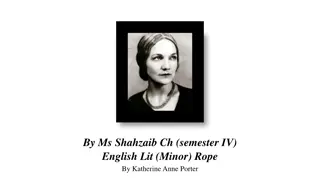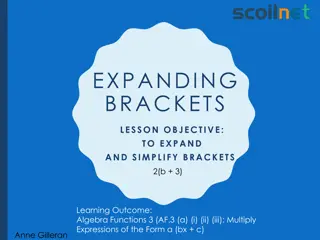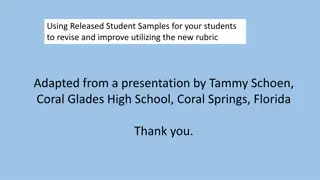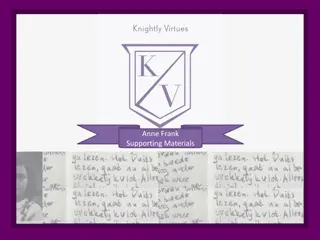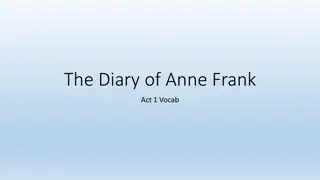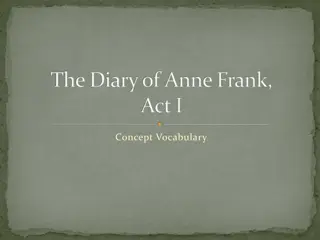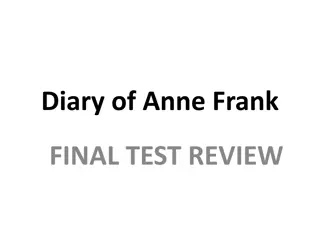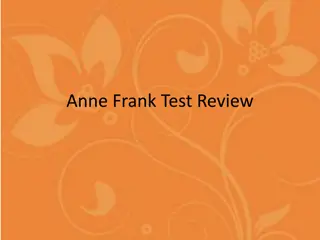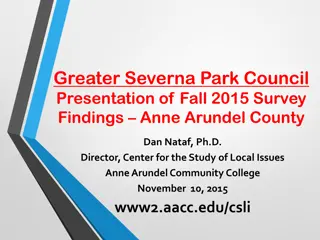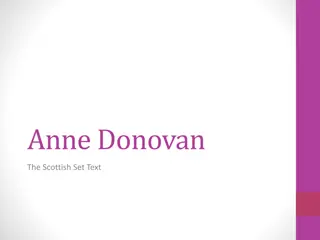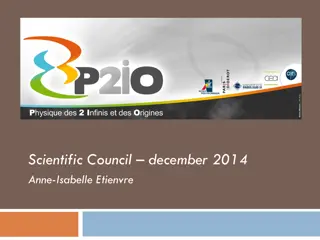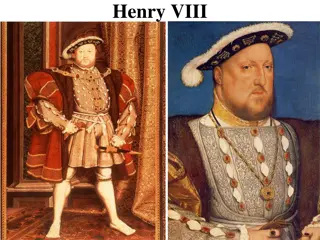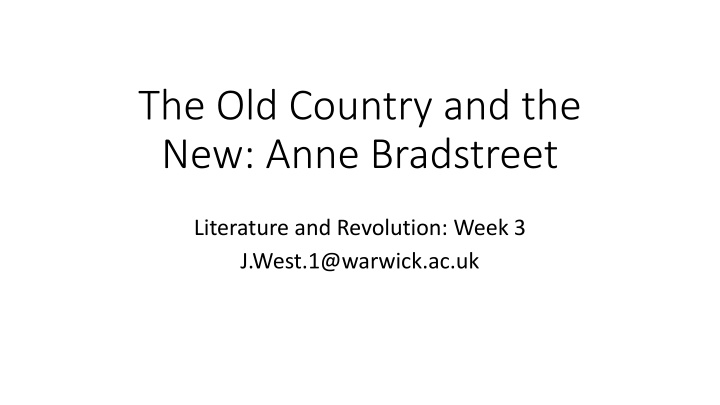
Exploring Anne Bradstreet and the American Colonies
Delve into the life and works of Anne Bradstreet, a notable figure in American literature and colonial history. Discover her journey from England to the New World, her publications, and the impact of religion and gender on her poetry.
Download Presentation

Please find below an Image/Link to download the presentation.
The content on the website is provided AS IS for your information and personal use only. It may not be sold, licensed, or shared on other websites without obtaining consent from the author. If you encounter any issues during the download, it is possible that the publisher has removed the file from their server.
You are allowed to download the files provided on this website for personal or commercial use, subject to the condition that they are used lawfully. All files are the property of their respective owners.
The content on the website is provided AS IS for your information and personal use only. It may not be sold, licensed, or shared on other websites without obtaining consent from the author.
E N D
Presentation Transcript
The Old Country and the New: Anne Bradstreet Literature and Revolution: Week 3 J.West.1@warwick.ac.uk
Week 3 Week 3 Mini Mini- -Lecture Outline Lecture Outline Bradstreet and the American Colonies The Tenth Muse: Publication and Protestantism at Home and Abroad Gender and Poetry
Religion, like a Religion, like a pilgrime pilgrime, westward bent , westward bent Religion, like a pilgrime, westward bent, Knocking at all doores, ever as she went. [ ] When Seine shall swallow Tiber, and the Thames By letting in them both, pollutes her streams: When Italie of us shall have her will, And all her calendar of sinnes fulfill; Whereby one may foretell, what sinnes next yeare Shall both in France and England domineer: Then shall Religion to America flee: They have their times of Gospel, ev'n as we. George Herbert, The Church Militant
Anne Bradstreet Anne Bradstreet Born Anne Dudley, 1611/12, probably in Northampton. She is the eldest daughter of Thomas Dudley, whom Anne praised for his devotion to public service and religion. Her father and mother moved to Boston c. 1625. Her father became the Governor of the Massachusetts Bay Colony. In 1628, Anne married Simon Bradstreet, the son of a local Puritan minister. Together, they travel to Boston in 1630 on board John Winthrop s ship, the Arbella. The decision to emigrate was apparently Anne s.
John Cotton (1585 John Cotton (1585- -1652) 1652) Works in Boston, Lincolnshire in a Puritan church. Preaches the farewell sermon in Southampton for the Winthrop s fleet, which the Bradstreets were on. Emigrates to America in 1633 and quickly establishes himself as a leading figure in the church community in New England. In 1650 he defends the execution of Charles I in a sermon on Revelation 15:3: And they sung the song of Moses the servant of God, and the song of the Lamb, saying, Great and marvelous are thy works, Lord God Almighty: just and true are thy ways, King of Saints.
The Tenth Muse The Tenth Muse (1650) (1650) Printed in London in 1650. I fear the displeasure of no person in the publishing of these poems but the author, without whose knowledge, and contrary to her expectation, I have presumed to bring to public view, what she resolved should (in such a manner) never see the sun; but I found that divers had gotten some scattered papers, affected them well, were likely to have sent forth broken pieces, to the author s prejudice, which I thought to prevent ( Epistle probably written by Bradstreet s brother-in-law John Woodbridge).
An Elegy UponSir Philip Sidney An Elegy Upon Sir Philip Sidney O brave Achilles, I wish some Homer would Engrave in marble with characters of gold The valiant feats thou didst on Flanders coast, Which at this day fair Belgia may boast. [ ] Thus man is born to die, and dead is he, Brave Hector by the walls of Troy we see.
In Honour of that High and Mighty Princess, In Honour of that High and Mighty Princess, Queen Elizabeth Queen Elizabeth Full fraught with honour, riches, and with days: She set, she set, like Titan in his rays. No more shall rise or set such glorious sun Until the heavens great revolution: If then new things, their old form must retain, Eliza shall rule Albion once again.
The Four Monarchies The Four Monarchies The Assyrian Nimrod Belus Ninus Semiramis Roman Romulus Numa Ancus Martius
The Four Monarchies The Four Monarchies Thus king and kingdoms have their times and dates, Their standings, overturnings, bounds, and fates; Now up, now down, now chief, and then brought under, The heavens thus rule, to fill the world with wonder. Yet shall this lion, bear, this leopard, ram, All trembling stand before the powerful Lamb.
The Prologue The Prologue From schoolboy s tongue no rhet ric we expect, Nor yet a sweet consort from broken strings, Nor perfect beauty where s a main defect: My foolish, broken, blemished Muse so sings, And this to mend, alas, no art is able, Cause nature made it so irreparable
Bradstreets Gendered Religious Voice Bradstreet s Gendered Religious Voice Bradstreet suggests that the alterity of the female poet entails no deficiency. Her self-deprecation simultaneously marks her identity and expresses her estrangement. She may be in a troubled relation to the Muses, but this clarifies her status as a Reformed poet and bears fruit in her poetics, as it causes her to make a self-conscious departure from generic convention. Charlotte Gordon, The First Shall Be Last : Apology and Redemption in the Work of the First New England Poets, Anne Bradstreet and Edward Taylor The Cambridge Companion to American Poets ed. Mark Richardson (CUP, 2015).
Dialogue Between Old England and New Dialogue Between Old England and New Look up the following early modern genres or forms: mother s legacy; poetic dialogue; prophecy. In what ways do you think Bradstreet is adapting the conventions of these genres or forms in this poem? How does this poem present the mother / daughter relationship? How does Bradstreet map this familial relationship onto her presentation of politics and history? What is the significance of the turn to prophecy in the concluding lines of the poem?


